15 Tools to Automate Your Workflow

With the rise of AI, automation has never been more significant in any workflow. Now, almost any job can be done by artificial intelligence, in one way or another. And surely, it will be able to do almost everything we do in the near future.
So, let's get into how you can use the best 15 workflow automation software to ease your workload and take advantage of AI automation.
15 Best Workflow Automation Software Comparison
If you are looking for ways to streamline your workflows, here is a table for you to have a general idea about the key features, use cases, and pricing options of the top 15 tools to use.
| 🖥️ Software | ✨ Key Features | 👀 Use Cases | 💲💲💲 Pricing Options |
| Maestra.ai | AI-powered transcription, captioning, and translation; multilingual support | • Content creation
• Accessibility |
Starts at $10/month |
| Trello | Task automation and due date management | • Project & task management | Free; Paid plans start at $5/user/month, Enterprise |
| Artwork Flow | Creative workflow management | • Content creation | Free; Professional $39; Enterprise |
| HubSpot | CRM, email marketing automation, lead scoring, analytics, customer support | • Marketing & sales
• CRM • Communication |
Paid plans start at $15/user/month |
| ActiveCampaign | Marketing automation, email, customer experience management, CRM | • Marketing & sales | Starts at $15/user/month; Enterprise |
| Salesforce | CRM with AI insights, predictive analytics, personalized marketing, automation | • Marketing and sales | Different for each cloud |
| Monday | Customizable workflows, project templates, time tracking, team collaboration | • Project & task management
• CRM |
Different for each product |
| Asana | Project tracking, task dependencies, workload management, team collaboration | • Project & task management | Free; Paid plans start at $10.99/user/month; Enterprise |
| ClickUp | Goal tracking, templates, real-time reporting, automation | • Project & task management | Free; Paid plans start at $7/user/month; Enterprise |
| Smartsheet | Automated workflows, reporting, dashboards, team collaboration | • Project & task management | Starts at $9/user/month |
| Hive | Workflow automation, integration with 1,000+ apps | • Project & task management
• Communication |
Free; Paid plans start at $5/user/month |
| Slack | Messaging, integrations with apps like Trello, Asana, and Salesforce, channels for collaboration | • Communication & collaboration | Free; Paid plans start at $8.75/month |
| Zapier | Workflow automation, connects with 7,000+ apps | • Task automation and project integration | Free; Paid plans are customizable |
| Make (formerly Integromat) | Workflow automation, visual editor, integrations with over 1,000 apps | • Task automation and project integration | Free; Paid plans start at $9/month; Enterprise |
| Cflow | Process management, approvals, reporting | • Task automation and project integration | Starts at $7/user/month |
A table comparing the 15 best workflow automation software.
Best Workflow Automation Software: Top Picks
With the right tools, we can focus on driving results without worrying about labor-intensive tasks. So let's dive into the details of the best workflow automation tools and find out what each of them has to offer.
1. Maestra
Maestra offers high-quality transcription, translation, captioning, and subtitling services for media content. It allows you to turn audio into text, subtitles or AI dubbing within a matter of seconds in 125+ languages. In addition, you can transcribe or caption content in real-time.
Maestra uses AI to automatically perform these tasks, and then you can edit automatically generated subtitles and captions. It allows you to collaborate on projects in real time too.
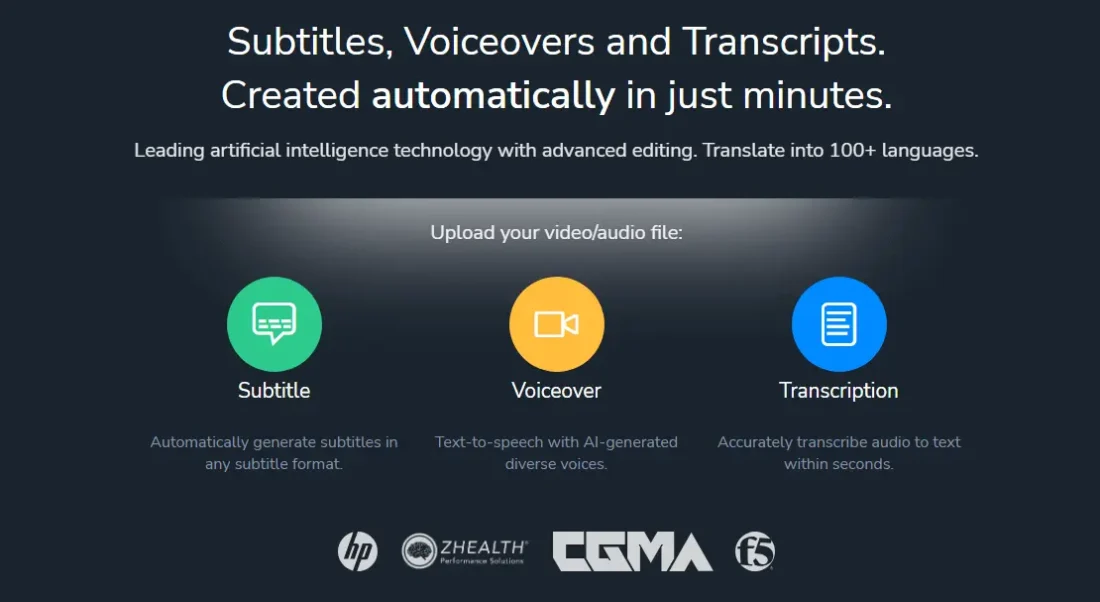
With a video to text converter, you can turn audio and video files into text within minutes to repurpose them. You can translate any content into 125+ languages with a few clicks and reach a global audience.
You can integrate Maestra with tools like Zapier, Slack, Zoom, and TikTok Ads Manager to take the streamlining of your workflow a step further.
Streamline Your Content Production
2. Trello
Trello is a project and task management software using the Kanban method. It visually organizes tasks and projects with boards, lists, and cards.
Boards allow you to see every step of the work and follow their status. There is also a timeline that shows you urgent tasks and allows you to make due-date adjustments with drag and drop.

The built-in automation tool called Butler analyzes your actions and offers automation for repetitive tasks. It also sends notifications and updates each task's status on your cards.
Trello provides ready-to-use templates for different use cases. You can integrate Trello with other tools such as Slack, Zapier, and Google Drive.
3. Artwork Flow
Artwork Flow is one of the distinguished project management tools because it focuses on artwork. It is an AI-powered tool that can be very beneficial to creative teams.
You can gather all your artwork in the library and sort them with automatic tags. You can create custom rules so that every work is checked for compliance.
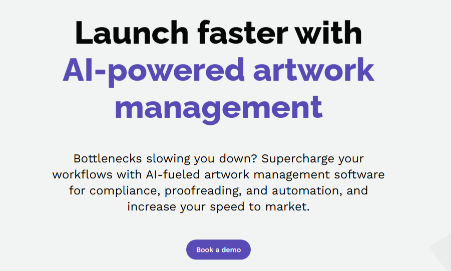
Artwork Flow claims to cut review time by half and save you over 500 staff hours by digitizing your entire packaging review process.
It allows you to collaborate with teams and companies. You can review others' work and provide feedback directly on their files.
4. Hubspot
Hubspot is one of the best workflow automation software because it can help you with customer relationship management and marketing. It is an AI-powered platform that focuses on customers. You can streamline your sales and marketing efforts while improving customer relationships.
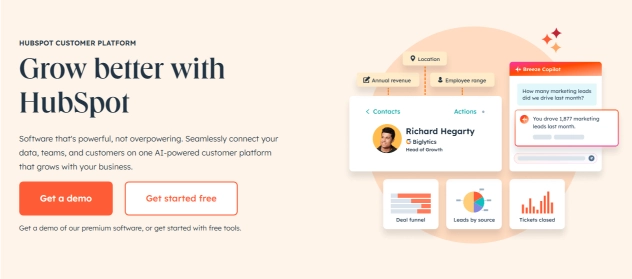
Hubspot offers different hubs: Marketing, Sales, Service, Content, Operations, and Commerce. Each hub offers different features. You can:
- store and manage customer information,
- analyze and automate marketing campaigns,
- streamline communication,
- provide customer support,
- build and manage websites,
- synchronize data across platforms.
5. ActiveCampaign
ActiveCampaign is a workflow automation tool that focuses on marketing. It enables you to build automations and email campaigns to reach your customers on desired channels. You can integrate ActiveCampaign with other apps such as Slack and Asana to improve your workflow.

You can track the success of your campaigns, spot trends, find new opportunities, and optimize your strategy according to the insights provided by AvtiveCampign.
You can design emails or choose among the pre-made templates. You can use the dynamic content feature to personalize different parts of your emails according to the recipient.
6. Salesforce
Salesforce is an all-in-one CRM tool. You can automate workflows and customer interactions with it. It uses Einstein AI to help sales, marketing, and service teams to predict customer behaviors.
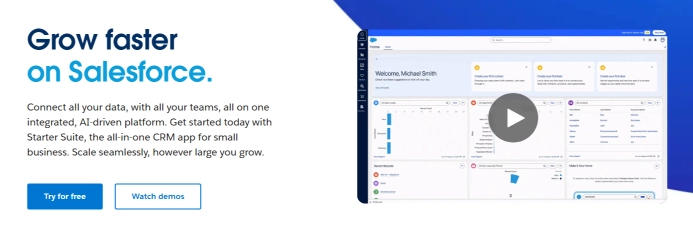
Salesforce is a cloud-based platform that offers different products for different industries, so you need to pick a product that focuses on what you need. These different products are called clouds.
There are Sales, Service, Marketing, Commerce, Analytics, and Community clouds. You can subscribe to one of them or combine multiple clouds according to your business goals.
7. Monday
Monday is a workflow automation tool that focuses on project management for different industries. You can gather data together on customizable dashboards and track your progress.
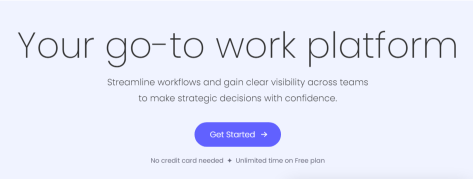
Monday automatically assigns leads to reps, sets reminders for upcoming activities, and sends notifications when a lead opens an email. You can produce polished content and create emails using the templates.
You can choose different products according to your field of business: Monday CRM, Monday Work Management, Monday Dev, and Monday Service. You can integrate Monday with tools like Slack and Google Drive to smooth your work processes.
8. Asana
Asana is a project management tool that focuses on teamwork. You can organize your tasks in a list, calendar, timeline, Gantt chart, or Kanban board.

Asana connects every team's goals enabling you to track overall company objectives. With Asana AI, you can see where to focus and which routine to automate.
You can create custom automations without doing any coding. You can connect other tools such as Google Drive, Slack, and Salesforce to Asana for better management.
9. ClickUp
ClickUp is another project management tool that offers multiple services. It focuses on productivity and collaboration. You can benefit from ready-to-use templates or create a custom project. It integrates with other tools you might need and helps with your workflow.

You can view your tasks in a list, calendar, Gantt, and Kanban formats. ClickUp provides visual reports about productivity and performance. You can track how much time you've spent on a task. ClickUp also enables you to automate repetitive tasks.
10. Smartsheet
Smarsheet is the best workflow management software for data management. It is a spreadsheet-based tool. It integrates with Slack, Hubspot, and many other tools to help you manage your workflow. It also provides ready-made, customizable templates.

Smartsheet saves you time by doing calculations and providing insights from your data. You can organize and visualize data effortlessly, and you don't need any coding to create custom automations. You can track workloads to monitor tasks.
11. Hive
Hive is another powerful project management tool. It visualizes your projects and tasks in various formats so that you can choose the best one for you. You can customize workflows without coding, track the time spent on a task, and automate your tasks.
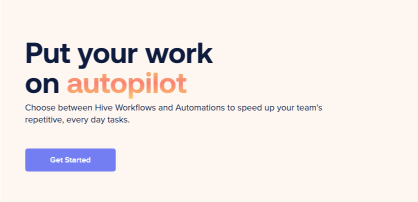
Hive enables you to chat with your teammates or have video calls without leaving the app. You can create notes and use them interactively with your co-workers.
Hive integrates with over 1000 tools including Zoom, Slack, and Teams to help you seamlessly manage your workflow.
12. Slack
Slack is among the most popular workflow management software. It integrates with various tools and simplifies your workflow by gathering everything you need in one place.
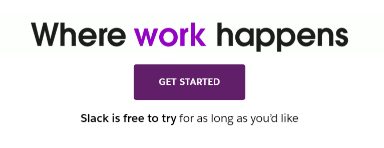
Slack enables you to chat with your team, send audio clips to each other, and join huddles. You can create channels and organize communication across different departments effortlessly.
While Slack mostly focuses on communication, it also provides a Workflow Builder that automates simple tasks. All you need to do is write a command and the rest is dealt with by Slack AI.
13. Zapier
Zapier is known for its broad automation options. It connects to thousands of other apps focusing on workflow management and social media platforms.
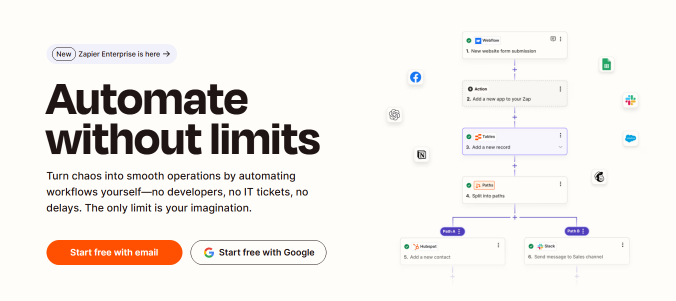
Zapier offers three products: Zaps, Tables, and Interfaces. You can use Zaps to create workflow automation, Tables to store and organize data, and Interfaces to create new tools without coding.
You can build workflows however you want, either with code or with drag and drop. You can use AI to personalize emails, analyze data, or summarize content.
14. Make
Make is one of the best workflow automation software because you can use it to automate complex tasks and workflows with great customization options. What makes it stand out is Make allows you to visually build and automate without limitations.
Make allows you to build without the need for coding knowledge. You can start from scratch or use pre-built templates. It focuses on visuals, and this makes managing workflows easier.

You can connect Make to other apps you need for your work such as WordPress, Hubspot, and ClickUp. Also, you can use the HTTP app and connect to public APIs. So, even if an app isn't supported by Make, you can make them communicate with each other and exchange data.
15. Cflow
Cflow is an easy-to-use workflow automation software. You can streamline multi-step processes easily just by dragging and dropping.
With Cflow, you can set some rules to automatically review and approve tasks. Also, it integrates with G Suite, Office 365, and many other tools to help your workflow.
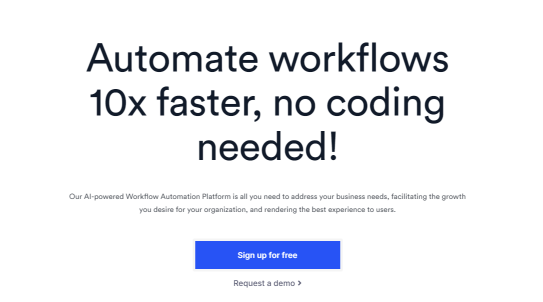
Clfow tracks performance. Its highly customizable dashboard provides you with visualized data. Its Business Activity Monitor (BAM) provides data about process times, bottlenecks, and efficiencies so that you can stay on top of your tasks.
Why Should You Use Workflow Automation Tools

The benefits of finding the best workflow automation software for you are countless. But, to name a few, workflow automation:
- streamlines operations,
- increases efficiency,
- improves collaboration,
- reduces errors,
- tracks progress,
- enhances productivity,
- saves money.
With all these benefits, you and your team can save time and focus on more critical points of your jobs.
Frequently Asked Questions
What is workflow automation software?
Workflow automation refers to efficiently automating time-consuming and repetitive tasks using software. Workflow automation software uses preset rules and triggers to perform tasks without manual labor.
What is the best program to create a workflow?
The best program to create a workflow is the one that is easy to use. It should offer flexibility and scalability for different needs. It should connect to the other tools you are using for your work and should allow you to collaborate on projects as a team.
How do I choose a workflow software?
There are tools offering multiple features.
To choose a workflow software, you need to decide why you need a workflow tool. You can use them for content creation, marketing and sales, project and task management, or communication and collaboration.
Other things you need to consider are customizability, ease of use, collaboration options, integrations with other tools, and analysis tools.
